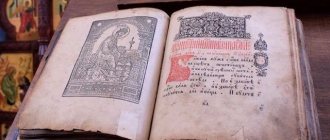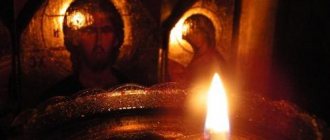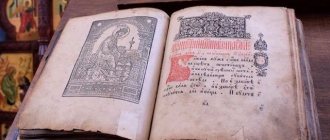What is the Psalter?
This is a sacred book that contains divine messages - psalms. According to historical data, the Psalter was compiled by King David, to whom the Holy Spirit came and commanded it to be done.
Find out what awaits you today - Horoscope for today for all zodiac signs
The Psalter plays an important role in the church world. This book is considered to be one of the most important after the Bible. The psalms glorify the name of God and his apostles. It is believed that reading the Psalter helps to exorcise evil spirits, resist devilish temptations, and protect oneself, loved ones and home.
Currently, prayers from the Psalter are almost the basis of Christian worship.
How to read the Psalter for a beginner?
If you have never sung psalms, you need to know about some of the rules of these ancient and powerful prayers that exist today. Previously, it was customary to read the Psalter from memory, but, of course, you do not need to learn the prayers by heart; it is enough to have a church collection in front of your eyes or print them out.
Due to numerous requests from readers, we have prepared an “Orthodox Calendar” application for smartphones. Every morning you will receive information about the current day: holidays, fasts, days of remembrance, prayers, parables. Download for free: Orthodox Calendar 2022 (available on Android)
You can gather a group of believers and divide the psalms among yourself so that each of you reads a certain section of the texts. At the same time, it is necessary to agree that everyone in kathismas mentions not only his own name, but also the names of all members of his group.
What needs to be done to ensure that the reading of the Psalter follows church canons:
- It is very important to light a wax candle or lamp while reading prayers. The exception is when you are on the road and there is no opportunity to light a fire nearby.
- Kathismas from the Psalter are pronounced only aloud. You can do it in an undertone, but quite clearly and articulately. Then not only your brain, but also your soul will heed the words from the sacred texts.
- It is very important to monitor the correct pronunciation of accents. If you make a mistake, you can radically change the meaning of the prayer, which is not good.
- Unlike many other prayers, these can be read not while standing, but while sitting. It is not surprising - reading the psalter is a very long and tedious task, and it is almost impossible for an ordinary unprepared person to withstand such an amount of time.
- But while saying the opening and closing prayers, you need to stand up. The same rule applies to Slava.
- It is very important to pronounce the text monotonously, without any expression or theatricality. Singing a little, but without unnecessary expression of emotions. It is believed that if a person reads prayers emotionally and with expression, he succumbs to devilish temptations and is unable to resist passions.
Sometimes the meaning of spoken sentences may be completely unclear to you. It’s not scary, you shouldn’t worry about it and don’t stop reading. The main thing is that everything is clear to your soul. Over time, you will begin to feel the meaning of prayers intuitively, and you will not need explanations.
Symbol of faith
Some are quite skeptical about the Psalter, arguing that the New Testament is understandable, but the Psalter is something that should be given special attention. But is this fair??? Now, Holy Week has begun and isn’t the Psalter being read especially intensely now??? If the Psalter were not a particularly important book, then perhaps it would not be read intensively during Lent, and especially during Lent. This means that this is especially beneficial for the soul.
And this is not just the usual reading of prayers - but here it is more difficult to understand and this is a feat! Prayer feat. If a person does not really understand what prayer work is and what kind of work it is, then the need for the Psalter and the significance of all this is also unclear. The Church itself established a special reading of the Psalter specifically during Lent. But this does not mean at all that this book should not be read outside of Lent. After all, during Great Lent the Psalter is read twice (most often this is observed in monasteries), and in churches where there is daily worship, at ordinary times - once a week.
From here we can trace a certain pattern - the Psalter is read both during Lent and not during Lent.
It’s just that it’s more intense during Lent, especially during Lent.
This applies not only to worship, but also to home practice. The Church itself is a model for us of the competent construction of our spiritual life. The Psalter is an intense prayer work. At the same time, some people think that the Jesus Prayer is enough; they can do without the Psalter. Of course, at some stage it is possible, but in general, if you continue to try to fight harder for the salvation of your soul, then it is extremely advisable to arm yourself with psalms.
After all, this is a very powerful weapon!!! St. Ambrose of Optina: In your own experience you will see how great the power of God-inspired psalm words is, which scorch and drive away mental enemies like flame. And prayer is always stronger with psalm words than with our own
.
St. Ephraim the Syrian: The sharpest sword against the devil is a psalm in the mouth of a monk.
Let the psalm be continually in your mouth. St. Neil of Sinai: Let the prayer psalm be in your mouth, for the utterance of God’s name puts demons to flight. Particular interest in the psalms usually comes with time. Saint Ignatius Brianchaninov: “For beginners, the reading of akathists to the sweetest Jesus and the Mother of God is very beneficial, and for those who have succeeded and have already felt some enlightenment of the mind, reading the Psalter.”
The everlasting psalter
The indefatigable Psalter is read not only about health, but also about peace. Since ancient times, ordering a commemoration on the Everlasting Psalter has been considered a great alms for a departed soul.
It is also good to order the Indestructible Psalter for yourself; you will feel the support. And one more important point, but far from the least important, there is eternal remembrance on the Undying Psalter. It seems expensive, but the result is more than millions of times more than the money spent. If this is still not possible, then you can order for a shorter period. It's also good to read for yourself.
Order from the monastery in Jerusalem
And the Jesus Prayer does not in the least contradict the reading of the Psalter
, but on the contrary, if there is not just weak, scattered prayer, but when our mind and heart are sanctified, then a special love for everything beautiful that happens thanks to Divine enlightenment begins to appear.
Writes to Rev. Barsanuphius of Optina: “Father Anatoly deeply understood the psalms and, listening to them, felt spiritual delight. “Kathismas are music,” he said, “when the reading of them begins during the all-night vigil, I cannot stop listening.” Every word is imbued with a deep meaning, and I am always sorry when the reader closes the book: I would just listen, listen endlessly. “And I get so bored during kathismas,” I objected to him, “I always strive to leave the church and return when they have already finished.” “That’s understandable,” answered Father, “and I did the same before.” My friend and I went to the church at the Academy, although the service there is not the same as in Optina, but still quite long, they read a lot. It used to be that we were sitting at kathismas and felt a push in the side. I already understand the conventional sign and begin to walk along the corridors; we walk and walk until they finally say: “Come quickly, now they will sing “Praise the name of the Lord”,” well, then we rush to church. Otherwise, sometimes you leave church and find yourself at home, drinking tea. But I soon realized that I couldn’t live like that. Fr. Macarius playing the psalter. And Father Fr.
Ambrose played it. This music of the soul is acquired through the Jesus Prayer.” The elder schema-abbot Savva believed that reading the Psalter is necessary for the Jesus Prayer, that the psalms and the Jesus Prayer are living water from one source: the Psalter supports the Jesus Prayer, like the walls of a temple support its roof.
Church services in Orthodox churches in Jerusalem
Sorokoust about repose
The everlasting psalter
Church note
Prayer for health
Sorokoust about health
Temples and monasteries where services are held
Like
SocButtons v1.5
Rules and features
As I already said, the Psalter stands apart from any other books of Holy Scripture. This is the only creation that is entirely included in the church statutes of Christian churches.
It is believed that in the kathismas of the Psalter all human life is sanctified, that this is an example of resistance to temptation and a great connection with God. This is why Christians value and respect this holy book so much.
Regarding church rules:
- In some cases, reading the Psalter requires permission from a priest. It is required if a believer wishes to take any vow or impose an additional prayer rule on himself. Otherwise, the priest’s blessing is not needed.
- It is forbidden to use psalms in prayers during the period from Maundy Thursday to Anti-Easter. This period is ten days.
- There is no need to recite the names of the psalms. Only the text should be read.
- You should pray every day, without missing a single one. Only then will the Psalter have enormous power and be able to truly influence your life, bring peace and tranquility into it.
- There are opinions that when reading the Psalter at home it is not necessary to adhere to a strict schedule. Much more important is a sincere attitude and understanding of why you need this prayer. The priests believe that a person should not depend on the volume of prayer or set some kind of plan for himself. It is better to come to this out of necessity, when you feel that your soul needs communication with God and cleansing.
Therefore, there are no strict rules, only sincerity and the ability to hear the desires of your soul. When communicating with God, turn off rationalism, brain and logic, listen to your heart and intuition. I believe that the words you speak are not as important as your sincerity and feelings.
Watch a video on the topic:
Psalter for Lent
Yes, the Psalter is read especially intensively in churches during Holy Week, but does this mean that Lent is the best time for singing psalms? I don’t think so, because this is more of a tribute to tradition, and you can start reading the Psalter when your heart asks. It’s just that during fasting this is done more often and intensely (twice).
What else can you do:
- Order services in the church for the repose of the deceased or for the health of living relatives, so that their names are mentioned during the reading of the Psalter.
- According to other opinions, it is better to pray on your own, putting part of your own soul into it, and not transferring responsibility into the hands of priests.
- By helping the souls of loved ones receive God's blessing, you cleanse your own soul, so independent prayer has a double effect.
It's amazing how sincere prayers work. I have heard stories more than once and seen with my own eyes people recovering from serious illnesses. Stories about how problems with work and personal life were resolved, peace and harmony came to the family. Thanks to sincere prayers, you change your inner state, and in response, the world around you and people “catch up.”
Holy Week
Holy Week is the six days of the week before Easter. Starting from Monday and ending on Saturday. The most unfavorable day for all work is Good Friday. On this day, Jesus was taken down from the cross and his body was buried.
During Great Lent, the Psalter is read twice in monasteries, and once in churches - in the morning and in the evening.
The morning service in the temple begins on Saturday and includes the singing of Psalm 17, and the evening service - 1. On Sunday only in the morning are Psalms 2, 3 sung. On Monday morning, Psalms 4, 5, 6, 7, 8 are read, and in the evening 18. On Tuesday, at the morning service, Psalms 9, 10, 11 are read, in the afternoon 12, 13, and in the evening 18. The last day, Wednesday - Psalms 14 - 16 are read in the morning, 19, 20 in the afternoon, 18 at the evening service.







